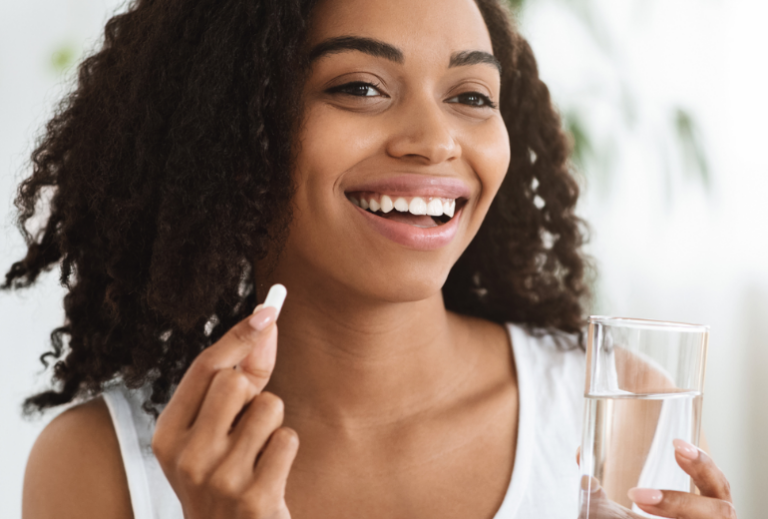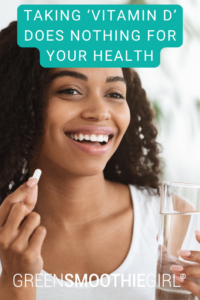Taking “Vitamin D” Does Nothing Good for You (100’s of Studies Show)

Eventually science and medicine are going to have to concede that “Vitamin D” does not whatsoever live up to the claims made about it.
Hundreds of randomized controlled trials show this.
So why hasn’t your practitioner figured this out? Partly because on the surface, it may seem that a higher “Vitamin D” level helps you—
–but actually higher D levels correlate to better health, while TAKING the pill known as “Vitamin D” does not.
It does NOT strengthen your bones, which is what we were originally told it would do. Nor does it improve your immune function. Like we’re told now that it does.
Vitamin D isn’t a vitamin at all. No case can be made that it is a vitamin. The only reason I can figure out that this steroidal hormone is labeled as a vitamin on the bottle is that people understand the word vitamin.
So it’s a good idea for marketing purposes. But it’s not true.
The medical definition of “vitamin” is a substance that cannot be made by the body and has to come from food.
The substance you call vitamin D is not found in food, is made by the body, and you really cannot get it from what is wrung out from sheep’s wool.
That’s what over 99% of “vitamin D” supplements are made from, making this byproduct of the sheep industry, when it’s dried and processed using chemicals and solvents, worth more than gold, by weight.
Is it worth anything, in what it actually does for your health, though?
Or is it just lining the pockets of tens of thousands of people and companies all over the Western world?
Another part of the scam is that we’re measuring 2 molecules, in the lab test–when dozens of molecules are involved in the steroidal hormone made by the body.
Also, the lab test you get is measuring blood levels. But secosteroid hormone D is stored in fat, in your body. We’re not measuring the right thing, or from the right place.
Hundreds of studies show D levels drop when a person is sick and their levels recover when the person gets well.
Also, a large study showed that having D measured in the blood considered to be “low” has no impact on health outcomes.
When you really study this subject, it becomes clear that low D levels are a marker of poor health and not a cause of it.
Part of the scam is that they’ve repeatedly pushed the range you’re supposed to be in, of the biomarker measured by blood labs, to higher and higher levels. So that more people believe they are “deficient”--and more people become the customer for the pills.
The one and only time I took these pills was when my hormone practitioner told me long ago that my D level was optimal, as it always had been, but she told me to take it anyway, just to be sure.
Against my better judgment, I bought the pills she private labeled and took them until my labs the following year.
At that time, my vitamin D level was below optimal for the first and only time in my history of getting labs drawn annually.
Now this all by itself doesn’t prove anything to you. It’s a n=1 study. It’s just a case study. But this is when I started researching this issue more deeply.
Now what most practitioners would do, in that case, is just tell you to increase your dose!
It’s a pretty strange cycle, really. I take D when I have optimal levels, my D goes down to below some arbitrary threshold—so I’m told to take MORE D!
I didn’t, though, and never took it again. And the following year and every year since, I have a high D level as a blood biomarker.
Really I don’t even want to test for that any more, the whole narrative having fallen apart for me long ago. And I have to pay for that lab test. But I do it annually, just for the sake of my ongoing research here.
There are no health consequences, according to 60 studies, attributed to having what is deemed as “low” vitamin D levels. And yet 95% of the holistic-oriented people I know are committed to the idea that the lab tests they get show they’re “deficient,” and they believe they need to get it from a pill.
They remain deficient year after year. And keep taking the pills. Often in higher and higher doses.
Everybody’s doing it, so it must be a good idea, right? That’s not particularly good logic.
People sometimes get angry with me sharing information like this, if they take vitamin D. It appears that we very much want to believe that whatever products we’ve used are good for us.
A few times, I’ve had a colleague or a friend show me a study to argue their point that we need Vitamin D pills, to argue that it prevents something.
A study that I then read, and every time I’ve pointed out to them that the study doesn’t actually support taking “Vitamin D” at all.
And every time, I ask them, did you read that study? And every time they’ve either said no, or they said they read the one-paragraph abstract–or they just don’t answer my question.
Anyone who spends two hours reading the meta studies on D with even rudimentary knowledge of research methods and decent critical thinking skills, will seriously question the widespread advice to take the pills made from sheep’s wool.
Or some “vegan” alternative wherein chemistry is involved, or it wouldn’t be a white powder in a capsule.
So far I haven’t been able to get the vegan “vitamin D” manufacturers to tell me how they make it. Try writing “vegan Vitamin D” companies and ask, “Can you tell me how your product is made? Are any solvents or petrochemicals or heavy metals involved?”
If you get an answer, please let me know.
More and more studies show that taking the pills doesn’t correct a deficiency, and doesn’t improve immune function.
Just like these same pills clearly don’t strengthen bone, which is how they USED to pitch this steroidal hormone to us–
–and they started selling it to dairy companies, who then advertised milk as “fortified” with “Vitamin D.” Since that makes the consumer think it’s better!
A meta analysis of 3,940 studies shows NO positive effect on bone fracture rate of those taking Vitamin D supplements. Remember, for decades, that’s what they sold it to us for.
That narrative finally came completely off the rails—so they just started telling us other benefits of it.
A study called BITAL followed 25,000 people, for 5 years, comparing half of them taking D, and the other half taking a placebo.
They found NO DIFFERENCE in cancer or heart disease between the groups. Which matters a lot when so many are claiming that taking the product made from sheep’s wool pills prevents those diseases.
So I mentioned that 60 studies show that lower vitamin D levels correspond to NO difference in outcomes between people who take Vitamin D and people who don’t.
What fools a lot of healthcare practitioners is that basically the two molecules they’re measuring have ASSOCIATIONS with selected outcomes, but taking the sheep’s wool pills do not AFFECT or CAUSE the health outcomes for huge populations of people in these studies.
When the BITAL researchers failed to find any positive benefit in the study with 25,000 people for 5 years, they did a secondary study, with 5,000 people. And went to the media and the healthcare industry saying they found one good thing: 0.4% less metastatic cancer.
Which is barely statistically significant, but that’s what made it into the media. The claim that Vitamin D prevents metastatic cancer!
And thousands of practitioners repeat this, that it’s preventative for cancer, because they’ve not dug into the history of this study and the followup study.
It makes sense that the media just repeats what they’re told, but doctors mostly don’t dig into the research EITHER, and just go along with the consensus.
The vast majority of functional medicine practitioners are affiliates for some D brand, or they private label a D brand, so it represents significant income to most of them.
My perception from trying to talk to many healthcare practitioners and influencers about this for years is that the more their income is linked to a product, the less interested they are in research that doesn’t support the need for that product.
I hope this is useful to you in saving your money on products that you don’t need.
I don’t have any alternative supplement to sell you, because your body makes the steroid they call D, and it’s highly unlikely that you’re deficient.
I hope you save some money and possibly negative impacts on your health, from taking cholecalciferol (see article here, about how it’s identical to rat poison).
(If you prefer, watch the video version of this blog post, here.)

Disclosure: This post may contain affiliate links that help support the GSG mission without costing you extra. I recommend only companies and products that I use myself.
Posted in: High-Vibe Living, Lifestyle, Mind/Body Connection, Natural Products, Preventive Care, Stress Management, Uncategorized















